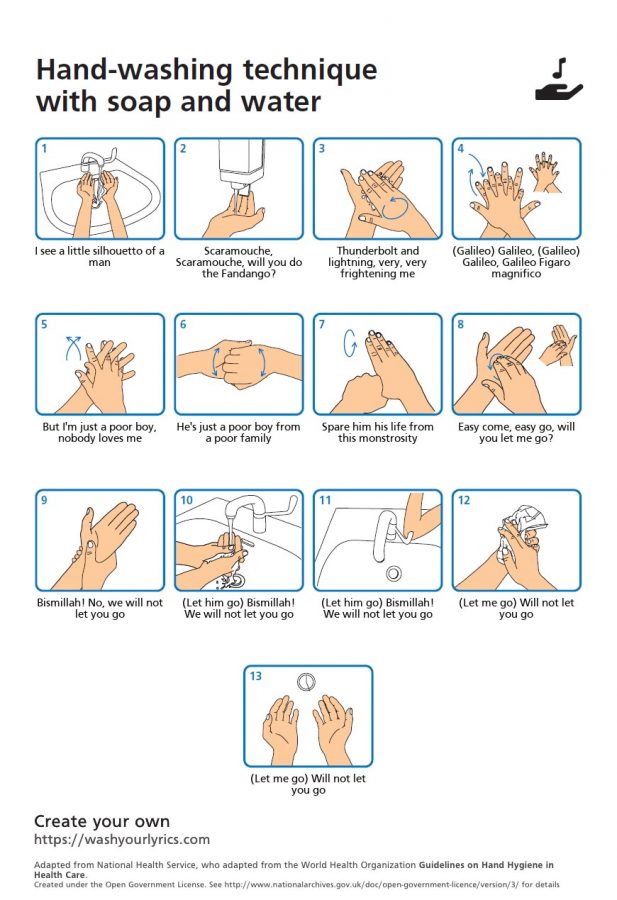Six Steps for Keeping Coronavirus at Bay
March 12, 2020
Updated March 18, 2021
From coronavirus to the common cold, sicknesses are in full swing this season.
Both students and teachers should know to take steps to prevent becoming sick, be able to determine the severity of your sickness, and work to keep from spreading illness.
The basic symptoms of a cold are a runny nose, fatigue, coughing, and sneezing. Flu symptoms include a fever, cough, sore throat, runny nose, body or headaches, chills, loss of energy and vomiting.
It’s important if you think you have the flu or something worse, that you go see a doctor.
To prevent catching and spreading sickness, it is important that you follow the following steps:
Wash Hands
Although the most recurring advice of all, washing your hands is the most important step to staying sickness-free. Washing hands is essential to staying healthy. It is crucial to, not only wash your hands after going to the bathroom, but also before and after eating, touching animals, dressing wounds, and sneezing and coughing. It is also ideal to wash your hands as soon as you get home from school.
To correctly wash your hands, first, wet your hands. Then, put soap on your hands, and scrub for twenty seconds, making sure to get all of your hands and up your wrists. Rinse off your hands, and fully dry them.
While antibacterial soap may sound extra-cleansing, it will not work against a virus. According to the U.S. Food and Drug Administration, there is no research to show that it is any better than regular soap, so you would be better buying usual soap.
Avoid Contact with Sick People
It may seem obvious, but it is crucial to avoid sick people. It doesn’t mean that you shouldn’t see them, but keep try and keep a few feet away from them.
Do not share food or drink, and try not to use any supplies after them. Many teachers have hand sanitizer, so you can wipe down classroom supplies before using them.
Disinfect Keyboards and Phones
Many people don’t realize it, but your cell phone is one of the worst places for bacteria and germs, as well as your computer keyboard. It’s easy to fix this problem, though. If you disinfect their surfaces with disinfectant wipes, hand sanitizer, or soap at least once every few days, you can kill almost all of the germs, and prevent spreading them.
Wear a Face Mask
Wearing a mask is one of the most important steps to follow. COVID-19 germs are mainly spread through breathing, so masks will help to keep these germs from spreading. Make sure that your mask forms a tight seal over your nose so that germs cannot escape or get in that way.
Most clothing stores currently sell masks, and there are plenty of different fabrics and shapes available, so try to find some that feel comfortable to you but still provides protection.
Stay Home from School
When you are sick, it is essential that you stay home from school. It’s more important to keep your teachers and peers safe than turning in your essay revisions, and your teachers will understand.
If you start to feel symptoms during school, you can ask to see the nurse. On average, about six students go to the nurse to leave school due to sickness every day, according to school nurse Carol Janssens.
Fully Cover Sneezes and Coughs
One of the most common ways to spread and catch diseases is through the air. When you cough or sneeze, you blast germs into the air, so it is important to fully cover. It is not enough to block it with your hand, ideally you should cover with a tissue, fully enclosing your mouth or nose. Afterwards, throw the tissue in the trash, and wash your hand with soap or hand sanitizer.
If you don’t have a tissue, the second best way to cover is in your elbow. Fully envelop your mouth or nose with your elbow. Afterwards, wash or sanitize your elbow and hands.
If you follow these steps, you should stay healthy, but even if you do get sick, you will have the knowledge to keep from spreading it to others.

